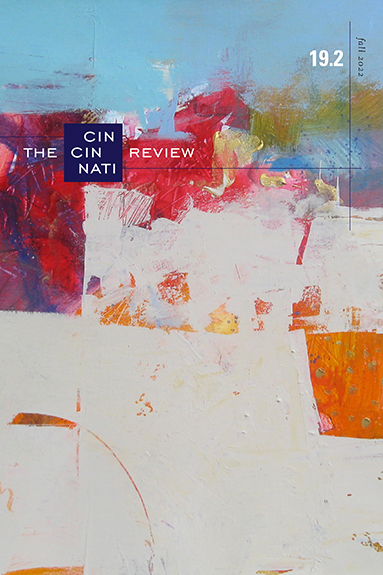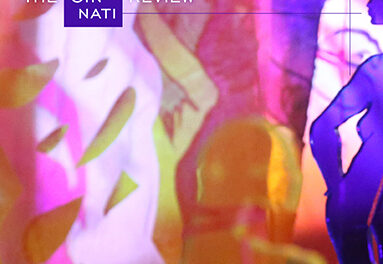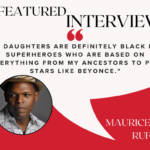We are pleased to share this craft essay by Gary Jackson on the process of creating an anthology, which appeared in Issue 19.2 as part of a special multigenre review and essay feature on anthologies (read the entire feature here):
The Future of Black: Afrofuturism, Black Comics, and Superhero Poetry. Eds. Len Lawson, Cynthia Manick, and Gary Jackson. Blair, 2021. 234 pp. $20.95 (paper).
As a graduate student stumbling headfirst into the poetic traditions and legacies I would soon inherit, I first encountered Lucille Clifton’s 1993 poetry collection, The Book of Light—specifically, four poems that comprise her “Superman suite,” directly addressing that whitest of superheroes. Those poems, one of my earliest introductions to Afrofuturism, became the blueprint for an aesthetic I still adhere to today. Each poem brings Superman directly into the speaker’s world. Take, for example, these lines from “final note to clark,” where the speaker removes Superman from his comfortable comic book pages:
they had it wrong,
the old comics.
you are only clark kent
after all [. . .]
how you must have wondered
to see me taking chances,
dancing on the edge of words,
pointing out the bad guys,
dreaming your x-ray vision
could see the beauty in me.
what did I expect?
The speaker here, a real person (in the world of the poem, of course), describes the fictional superhero’s inability (or unwillingness) to help her navigate real-world dangers. She counters this approach in the poem “note, passed to superman,” which seeks to empathize and humanize Superman while providing commentary on racial and gender discrimination:
i understand the cape,
the leggings, the whole
ball of wax.
you can trust me,
there is no planet stranger
than the one i’m from.
Who better to identify with the idea that Superman must negotiate constant othering and engage in modes of assimilation by manipulating his outward appearance than Lucille Clifton (or, at least, a version of Clifton as the speaker), who once famously said “I am a black woman poet and I sound like one.” In directly engaging with Superman, she brings him to life and acknowledges his agency, revealing new insight about what he represents, from the subject position of a Black woman poet. Reading Clifton’s poems gave me explicit permission to explore intersections between Black life, speculation, and fantasy that actively resist a narrow depiction of Blackness. This aesthetic has guided me throughout all my creative and editorial work, including a recent anthology I was invited to coedit.
My first book, Missing You, Metropolis (Graywolf, 2010), attempts to do what Clifton deftly executes in her four Superman poems. I wanted to recontextualize what superheroes represent and to examine their humanity from the subject position of a young Black man growing up in the conservative Midwest, while also exploring other themes such as escapism and self-destruction. Whether I was conscious of it or not, I was working out my own poetic aesthetics in that book, and even my very identity. Growing up as a Black nerd in Topeka, Kansas, in the ’80s and ’90s, I heard from others that I was either not Black enough or too Black—sometimes, to my bewilderment, simultaneously—depending on the people I was around or the circumstances of my surroundings. My poetry became an outlet for negotiating my intersectional identity in relation to an assumed monolithic Black identity.
The idea that there is a universally agreed-upon definition of Blackness or Black culture is something with which many Black writers contend. Consider this excerpt in The Blacker the Ink: Constructions of Black Identity in Comics and Sequential Art (Rutgers University Press, 2015), a collection of essays critically analyzing comics, edited by Frances Gateward and John Jennings. In their introduction titled “The Sweeter the Christmas,” they acknowledge: “The Black image has had a very troubled history in the United States. . . . [T]his collection seeks to investigate those histories and where those narratives overlap, create conflicts, and accent each other. The various explorations of Black identity in this volume are, again, an attempt to recontextualize the images connected to the Black body and its depictions in the comics medium while also offering alternative methodologies of dislodging Blackness as a monolithic identity.” Blackness is perpetually defined and redefined in this country, primarily by white America, usually based on an assumed set of general characteristics and traits. Those criteria are then used to evaluate individuals: You are too Black. You are not Black enough. Gateward and Jennings’s collection examines many narratives of Black life through the critical lens of a multitude of Black scholars who are not governed by a singular mode of Blackness. As someone who often writes poems that (I hope!) also resist easy categorization under some monolithic Black identity, I share their desire to “dislodge” and disrupt that generalized (and essentializing) fabrication. Of course, as one writer, I can only do so much. My work shouldn’t be viewed as representative of Black nerd poetry or superhero poetry or speculative poetry or Afrofuturistic poetry. As one writer, I can offer my take on those intersectional cross sections of culture, but how much more inclusive and fun would it be to gather a community of writers who have all dipped into various modes of pop culture and speculation?
So in spring 2019, when Len Lawson pitched me his idea about coediting an anthology about Afrofuturism and superhero poetry, with himself and Cynthia Manick, I immediately signed on. And in November 2021, Blair Press published The Future of Black: Afrofuturism, Black Comics, and Superhero Poetry.
As an editor, I wanted poems that celebrate a range of voices but also showcase a range of aesthetics. Similar to disrupting a monolithic Black identity, I also wanted to stretch thin the notion of a Black Aesthetic, which I’m heavily borrowing from Evie Shockley’s definition of the term. In her introduction to Renegade Poetics: Black Aesthetics and Formal Innovation in African American Poetry (University of Iowa Press, 2011),she says: “The Black Aesthetic suggests, among other things, a set of characteristics of black art—poetry, in this case—that are said to be derived organically from African and African diasporic cultures and yet, paradoxically, must often be imposed upon African American poets.” Instead of a wide range of approaches to art, the Black Aesthetic is a codified set of assumed rules that results in a very familiar and reductive refrain under the guise of aesthetic critique: Your work is too Black. Your work is not Black enough. Similar to monolithic Black identity, the Black Aesthetic originates from the myth that all people of African descent share certain values, knowledge bases, and cultural understandings that should be adhered to in their art. Of course, this is not true, yet it’s surprising how many popular depictions (and critiques) of Black culture seem rooted in these narrow definitions.
Afrofuturism also resists standard categorization. Though many consider it to be “Black science fiction and fantasy,” even that label falls short. Scholars and writers such as Alondra Nelson, Mark Dery, Sheree Renée Thomas, and Nnedi Okorafor have created varying definitions of Afrofuturism (or Africanfuturism, as Okorafor prefers), though most agree that the term exists somewhere in the intersection of African diasporic culture and speculative worlds (specifically technology, but this, too, seems overly limiting). I am not much interested in which label fits best. Even Clifton’s Superman poems would only partially fit: Superman may be an imaginary character, but the speaker and the world embodied in those poems are not rooted in fantasy or science fiction. There are poems in the anthology that speculate on the ghost of Frederick Douglass, an alternative ending for Queen & Slim, Sun Ra speaking to Gucci Mane, the costs of being your own superhero and beating cancer, and the experiences of watching Miles Morales on the silver screen with your children, and playing Grand Theft Auto III. The anthology also spotlights poems like Douglas Kearney’s “I Imagine I Been Science Fiction Always,” which features a speaker reckoning his very existence against both natural and unnatural forces, making explicit the parallel between the raced body and supernatural body horror (aka Frankenstein): “Was I a simple machine—I’d have more leverage—more pull—I could screw with their theirness better—I could make it plain,” the speaker says, and “I don’t even know if what any of them put on me is flesh // But I know it sure as shit isn’t skin.” Other poems, like Tracy K. Smith’s “My God, It’s Full of Stars,” examine the cosmos through the mix of artifice and reality in the iconography of sci-fi films like The Omega Man and 2001: A Space Odyssey. Smith juxtaposes pop culture with her father’s work on the Hubble Telescope and those initial captured images “so brutal and alive it seemed to comprehend us back.” These poems all incorporate aspects of Afrofuturism, and they all engage in varying degrees of world building and speculation, rooted in the past, present, and future, sometimes featuring the uncanny, other times the everyday. They don’t all require fantasy or science fiction as necessary components, but they are all fueled by Black imagination. For me, that’s enough. I want the tent to be as wide and open as possible.
Another aim of mine as an editor was to provide space for Black poets to explore other modes and speech acts about subjects beyond this country’s existential crisis with race, racial violence, and traumatic history. While they are certainly subjects worth exploring in poetry, the pressure for Black writers to constantly confront them in their craft can feel limiting. As an editor, I wanted to relieve a little of that pressure for other writers in the same way I have for myself. I wanted to give them an opportunity to write Black joy if they desired, or any emotive prerogative of their choosing. I wanted to remind the world that Black poets are not here only to perform grief and trauma. I wanted Afrofuturism to be the umbrella that our poems could gather under.
“Blackness is a medium that Black people of the world have inherited and have added on to as the story has unfolded through history,” Gateward and Jennings argue. That story, like us, is multifaceted and far more nuanced and complex than any one poetic trajectory or movement can capture, even the label Afrofuturism. The poems within The Future of Black represent a range of Black aesthetics instead of a singular one. To quote Evie Shockley’s own definition of widening Black aesthetics, these poems represent a “a multifarious, contingent, nondelimited complex of strategies that African American writers may use to negotiate gaps or conflicts between their artistic goals and the operation of race in the production, dissemination, and reception of their writing.” I can only hope that my desire to disrupt homogenous notions of Blackness and the Black Aesthetic is reflected in the book. It’s a joy to feature some of the many writers who have been doing this work for years, as well as those who are just now beginning their careers. As always, we write ourselves into our own futures, heavenly and brutal, as distant as Superman’s Metropolis, Sun Ra’s Saturn, or another universe entirely, and with a breath, you can go anywhere, the way only language knows how.
Gary Jackson is the author of the poetry collections origin story (University of New Mexico Press, 2021) and Missing You, Metropolis (Graywolf, 2010), which received the 2009 Cave Canem Poetry Prize, and coeditor of The Future of Black: Afrofuturism, Black Comics, and Superhero Poetry (Blair, 2021). He’s an associate professor at the College of Charleston.









